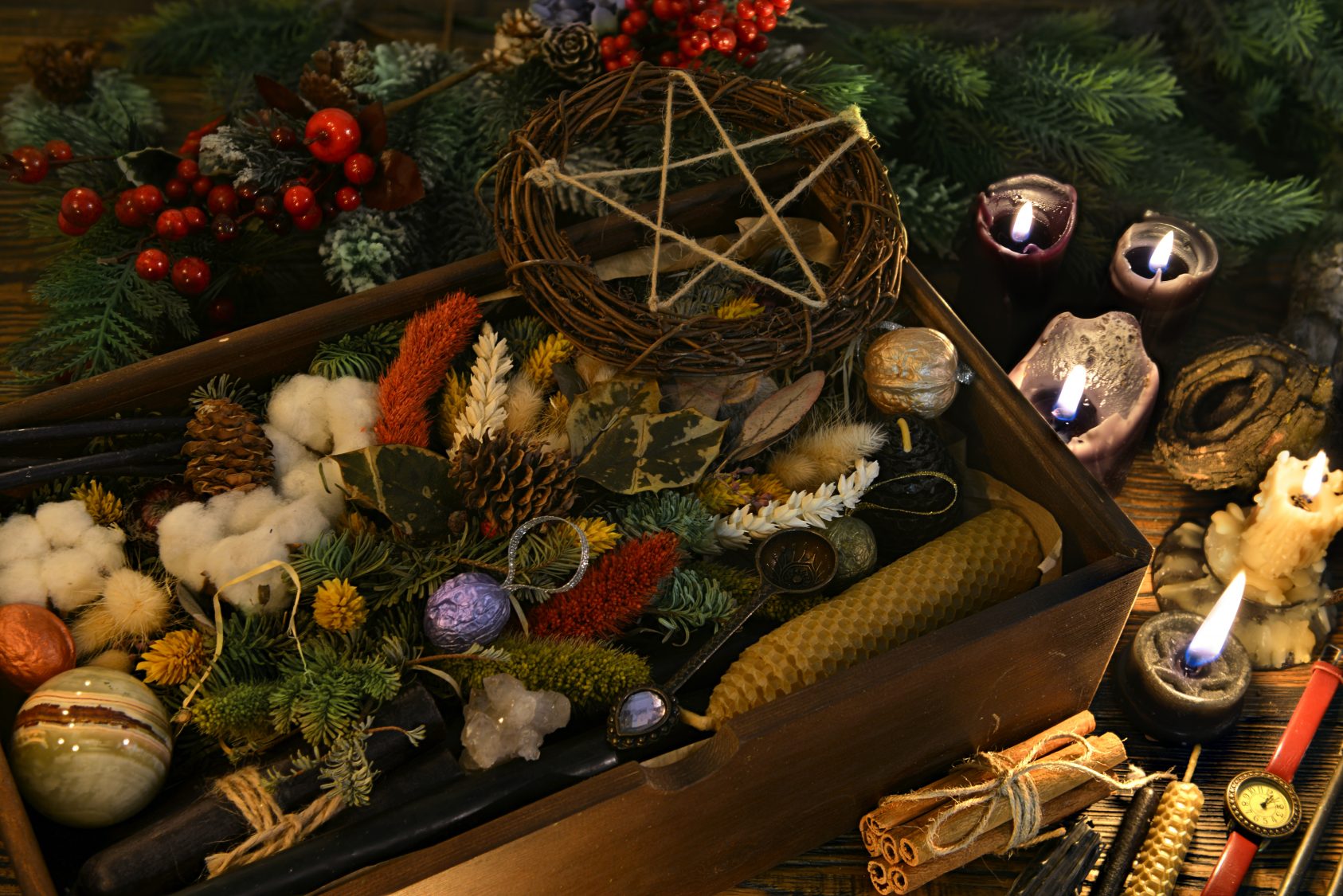By Steve McAlpine (adapted by Alasdair Belling from ‘ Pagan Christmas’ on the Delorean Philosophy podcast)
Oh un-holy night
Well, it’s happened again – or at least I heard about it. A community Carols service at which the organisers baulked
What did they baulk at?
They baulked at the suggestion by one of the churches invited to be involved. That the actual story of Christmas is read out. You know the one about Jesus and Mary and the shepherds and wise men – stuff like that. The thing that it’s all about in the first place.
A bit of too-ing and fro-ing ensued and eventually, permission was given to read out the original Christmas story at a carols event. Fancy that.
The fear of course was that someone was going to be offended by it. Who that someone is we’re not quite sure, but there’s a trope out there; A “someone” who fits a template created by town councils and government departments.
Before we get all culture wars and bemoan the absurdity of all of this it’s worth pausing to realise that all that’s happening with Christmas is that it’s becoming just like so much of the other stuff that Christianity gave to the world. The Human Rights stuff, the idea of humility as a virtue, not a vice, the need for charity for those who are weak – All the stuff that many think just sprang up from nowhere.
If we can have the fruit of the gospel without the root of the gospel that will be just fine. If we can have the effect Without the cause, the trimmings without the turkey, the packaging without the present, that will be just fine for us.
The recent census data in the western nations – notably Australia and the UK this year – shows that nominal belief in Christianity is dropping off. The days even the Christmas and Easter types are long gone. That won’t stop a lot of churches from trying to reinvigorate them.
Sermon titles and marketing campaigns will get sassier and smarter in order to provide some hooks for busy and distracted people his year. It’s easy to think “Is this just the trend”?
At Christmas, churches will push harder and harder and society will block its ears more and more
Am I sounding like the Christmas Grinch? Perhaps … but as we tick off the years we have to admit that the gaps and opportunities for a public witness to what Christmas is actually about growing fewer and fewer and those that remain to get completely swamped by the fruit of the Christmas story.
A new form of modern paganism
Christmas is (probably) a barometer for the church as to where its influence lies. More and more Christmas carols events are run by secular organisations We don’t call the public Christmas shots any longer.
If it’s a surprise to you or a shock or makes you angry then you’re probably not across just how much the Christian frame has drained away from the culture. Each year we have to read article after article in the mainstream media about how Christmas is really just a rip off of paganism and that the whole thing was just an attempt to paper over the past and give it a Jesus-y kinda sparkle. Like the tinsel and drunk uncles, it will likely get trotted out again this year.
Secular historian Tom Holland who has shown an increased interest in Christianity in recent times Ddebunked this myth a few years ago. These supposed parallels between ancient paganism and Christianity are simply not there Its links to Christmas are tenuous, to say the least and are easily disproven by scholars.
It’s modern paganism that has become a real concern over Christmas, and this has more to do with the need for a redress of our seeming lack of diversity in our culture.
it would seem that the biggest threat to diversity in the West is – ironically – the most diverse belief system in terms of social groups, ethnicity and global spread – Christianity.
Christianity blew up simply because it was so transferrable. Every culture could belong. It wasn’t tribal. It wasn’t for the rich. It wasn’t simply for the powerful or just for the men – It was for everyone.
This fact seems to have been lost in our current diversity push. The push for more diversity
does not extend to leaving the Christmas message intact. The wise men now have to bow the knee to a new Messiah that will somehow lead us to a Promised Land.
Now if you’re a traditional Christian it’s easy to get a little frustrated by it all. Is the window closing even on the one event we have left in the public square that has a solid theological centre? Perhaps… But let’s not be revisionist here. The noise of a post-Christian Christmas has been ramping up for some years. We’ve been going on about the commercialisation of it all for some time. There’s a definite queasiness or at least there should be – about the excesses of it all.
The message of Christmas wasn’t lost to the public with the queasiness felt by secular, progressive organisations towards the actual story of Jesus – that’s just a symptom of our late modern society.
Wealthy capitalism is as much to blame for the loss of the framework as “woke” culture is for the disconnect between Christmas and Christianity. Any form of giving that doesn’t implicitly recognise the prime giver at Christmas is just as hostile to the Christmas story and a misdirected diversity agenda at your local council carols.
In his great new book, Biblical Critical Theory, French Philosophy Scholar Chris Watkin speaks about the difference between a culture of lavish gift-giving that has God’s selfless generosity at its centre, and a culture that does not. Watkin says that something critical is lost when we give up the idea of free gift – a biblical idea rooted in covenant and the promise-keeping God. He writes;
“We are joyful children on Christmas morning receiving unexpectedly lavish gifts from loving parents. Free gift – not a contractual obligation, is at the heart of the Bible’s picture of reality, just as it is at the heart of the Bible’s picture of redemption. If this principle is followed through, it yields a world in which the poor, the weak, and the aged are not cast aside because they have nothing to put on the table in the great business deal of life, but they are cared for and honoured.”
He goes on;
“Both the paradigm of gift and the paradigm of the market have at their heart an idea of excess, but their respective excesses stand in stark contrast. The biblical excess of creation is God’s superabundant divine generosity of freely and lovingly bringing into being an unnecessary world – and its issues in measureless praise and wonder.
The market paradigm of excess, by contrast, is a surplus of overproduction, and overconsumption …these two rival models of transgressing the limits of the expected. Both seek to assuage the deep human longing for richness and abundance. The first plunges us into the ocean of God’s bottomless generosity, the second contents itself to scratch around in the broken cisterns of limitless accumulation.”
If we put this all together, here we are at Christmas in the late modern world, buffeted by the cross-pressures of late market capitalism and it’s a desire to sign us up contractually to a form of giving without the Giver. It’s a progressive post-Christian culture that views the actual Christmas story as hostile to a diversity program of its own making – one that other minority faiths in our western setting have no interest in signing up for no matter how many times they are patronisingly offered it by non-religious people.
It’s little wonder that we run the risk of Christmas feeling completely desiccated by the forces surrounding us.
So how can we be merry?
Well for one – let’s not get Grinchy. There’s no room for that sentiment in the current cultural moment – even if it is tempting.
In fact, we do see it often in the face of the sheer stupidity of baulking at the Christmas story being read out at a carols service. It’s a symptom of something bigger … of seeking – as Australian pastor and author Mark Sayers puts it – the kingdom without the king.
But perhaps we ought to just hold our nerve. The story is ours – it belongs to the Christians regardless of how the marketplace capitalists or the backyard historians wish to contort it
That’s why I think that churches can still lean into the deep difference between what the gospel offers at Christmas and what the wider society offers. The fall away of the Christianised culture may indeed be the necessary step in showing the stark contrast between the two new covenants. The stark contrast between the Christmas covenant And Happy Holidays covenant.
Covenant people will get to model true diversity with a celebration involving all sorts and types being invited to the table. We’ll get to model true generosity – a way of giving without expecting anything back.
As our society becomes more mean-spirited and even less diverse in terms of what is allowed to be expressed in the public square, the church can become a sanctuary for those who are looking for something more during this season than a glitzy packaged reindeer and snow event, devoid of the scandal of the incarnation.
Maybe – just maybe – in the coming decade as the mystery of the true Christmas story becomes even more mysterious, we’ll see a return – perhaps only a trickle – but a return nonetheless of people looking for some truly good news. Looking past market capitalism and progressive secularism for something that has weight and meaning – a deep well that will satisfy.
We are told after all that “Where meek souls will receive him still, The dear Christ enters in.”
That great irony hey? That the Christmas Carols sung so unthinkingly by so many are the deepest theology we can often get, and give us the deepest promises we could ever hope for.
He rules the world with truth and grace
And makes the nations prove
The glories of his righteousness
And wonders of his love.
God hasn’t finished with the nations yet – not even the Western nations. And especially not this Christmas.

Want to be further undeceived?
Check out our network of podcasts and articles in the Undeceptions Library.











































